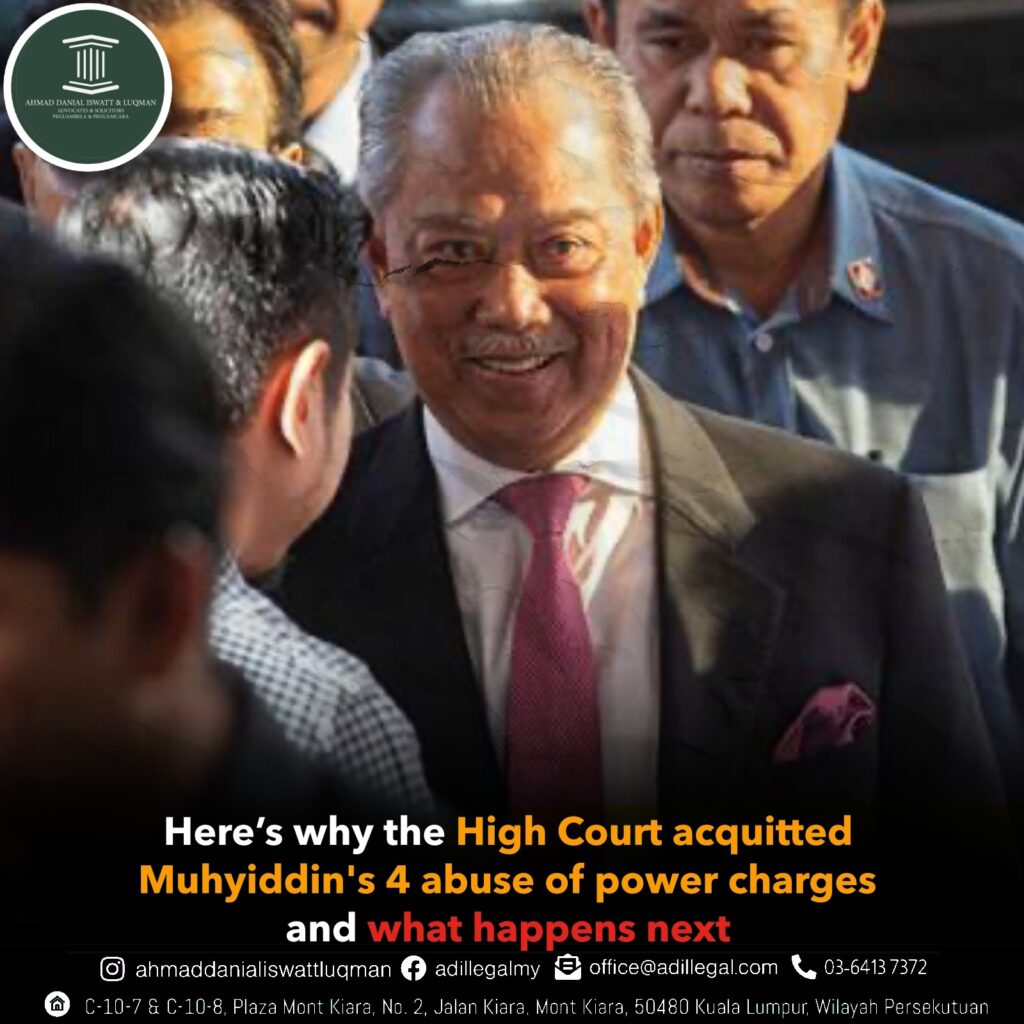
Here’s why the High Court acquitted Muhyiddin's 4 abuse of power charges and what happens next
It was all smiles for former Prime Minister Tan Sri Muhyiddin Yassin recently after he garnered back-to-back “victories” that would undoubtedly benefit his political career. First, Perikatan Nasional (PN), the political coalition of which he is chairman, had an impressive showing in the 2023 State Elections and just a few days later, 4 of the 7 criminal charges against him have been discharged and acquitted by the Kuala Lumpur High Court.
The 4 acquitted charges were in relation to alleged abuse of power by the Pagoh Member of Parliament (MP) linked to the Jana Wibawa programme during his premiership. However, Muhyiddin’s 3 other charges still remain, which include charges under Section 4(1) of the Anti-Money Laundering, Anti-Terrorist Financing and Proceeds of Illegal Activities Act 2001.
Nevertheless, all attention seems to focus on the acquitted charges rather than the ones which remained. For Muhyiddin supporters, this was vindication for the former Prime Minister while others speculate as to why the charges failed and whether this would signal the end of the charges.
Well, there are many valid reasons as to why the charges were quashed and the acquittal doesn’t necessarily mean the PN chairman is off the hook. Join us as we explain the decision by the Kuala Lumpur High Court in detail below and what can be expected regarding the cases moving forward.
Why Muhyiddin’s 4 abuse of power charges were acquitted
Firstly, let’s establish the charges against the former Prime Minister which were acquitted. On 10 March 2023, Muhyiddin was slapped with 4 charges framed under Section 23(1) of the Malaysian Anti-Corruption Commission (MACC) Act 2009. Should he be found guilty of the offence, Muhyiddin may face up to 20-year jail or a fine of 5 times the value of the money solicited, or RM10,000, whichever is higher.
The 4 charges were for:
- Receiving bribes amounting to RM200 million from Bukhary Equity Sdn Bhd on behalf of Bersatu, allegedly committed at the Prime Minister’s office in Putrajaya between 8 and 25 February 2021
- Soliciting bribes of RM1 million from Nepturis Sdn Bhd on behalf of Bersatu, allegedly committed at the same premises between 20 March 20 and 20 August 2021
- Soliciting RM19.5 million from Mamfor Sdn Bhd at the Prime Minister’s office between 20 March and 20 August 2021
- Soliciting RM12 million from Azman Yusoff, allegedly committed at the Prime Minister’s office between 20 March and 20 August 2021
So, why were the charges quashed? To put it simply, the charges by the prosecution were flawed and defective. Specifically, High Court Judge His Lordship Datuk Muhammad Jamil Hussin who presided over the case made the ruling on 2 grounds, namely the lack of details in the charges and that the accused was charged on offences unknown to the law.
On the first ground, His Lordship Datuk Muhammad Jamil Hussin elaborated that the prosecution didn’t include details of how the offences were committed as stipulated under Section 154 of the Criminal Procedure Code below:
Details of how the offences were committed are especially important for charges under Section 23(1) of the MACC Act (which the 4 charges against Muhyiddin were framed under) as the provision when read together with Section 23(2) of the same Act is about the accused making a decision or taking action regarding a matter. Section 23(1) and 23(2) of the MACC Act is as below:
One recent example of the details being included in a charge on an offence under Section 23(1) involves another former Prime Minister Datuk Seri Najib Razak in the infamous PUBLIC PROSECUTOR v DATO’ SRI MOHD NAJIB BIN HJ ABD RAZAK [2020] MLJU 1254 case. In the charge against Najib, it was stated the details of the offence committed, which is to have been involved in a decision on behalf of the Malaysian government regarding the matter.
Such detail is expressly missing from the 4 charges against Muhyiddin, whereby it was not stated how the offence was committed, whether the applicant made a decision or took action and in relation to which matter. The learned judge thus labelled the charges as vague and left the applicant to speculate; something that shouldn’t happen.
Meanwhile, on the second ground of the accused being charged with offences unknown to the law, the learned judge asserted that the charges were flawed for not disclosing an offence under Section 23(1) of the MACC Act. This is because, in the charge, the applicant states Bersatu as an “associate” when it is a registered society registered under Section 7 of the Societies Act 1966.
However, any society registered under Section 7 of the Societies Act 1966 is not considered an associate as per the definition of Section 3 of the MACC Act below:
This is because the said Act uses organisations and societies separately, hence an organisation is not included as a society. Instead, Bersatu is considered a non-affiliated society as defined under Section 3 of the MACC Act. Therefore, His Lordship Datuk Muhammad Jamil Hussin found that the accused was charged with an offence unknown to the law.
Due to the flaws in the prosecution’s charges mentioned above, Muhyiddin was rightfully discharged and acquitted by the Kuala Lumpur High Court.
What happens next?
It is worth noting that the acquittal doesn’t mean that Muhyiddin is now free of the abuse of power charges. This is because the prosecution can appeal the decision by Justice Datuk Jamil Hussin to cancel the 4 charges under Section 23 of the MACC Act.
In fact, Attorney-General Tan Sri Idrus Harun announced that a Notice of Appeal against the entire decision had been filed on the very same day Muhyiddin was acquitted. In relation to that, it is to be noted that even though some might say Muhyiddin was acquitted due to technical grounds, the fact remains that it was a discharge and acquittal (DAA).
This means that if all the appeals by the prosecution failed, they would amount to full acquittal and accordingly, the Pagoh MP may not be charged based on the same facts again. With all of that in mind, Muhyiddin now just has to wait nervously until the appeal is heard to see whether the charges will proceed to trial.
For more insights into the Malaysian legal system such as this, do make sure to follow us on Facebook and Instagram or visit our official website. You can also read our articles on the popular Malaysian news aggregator app Newswav here.







